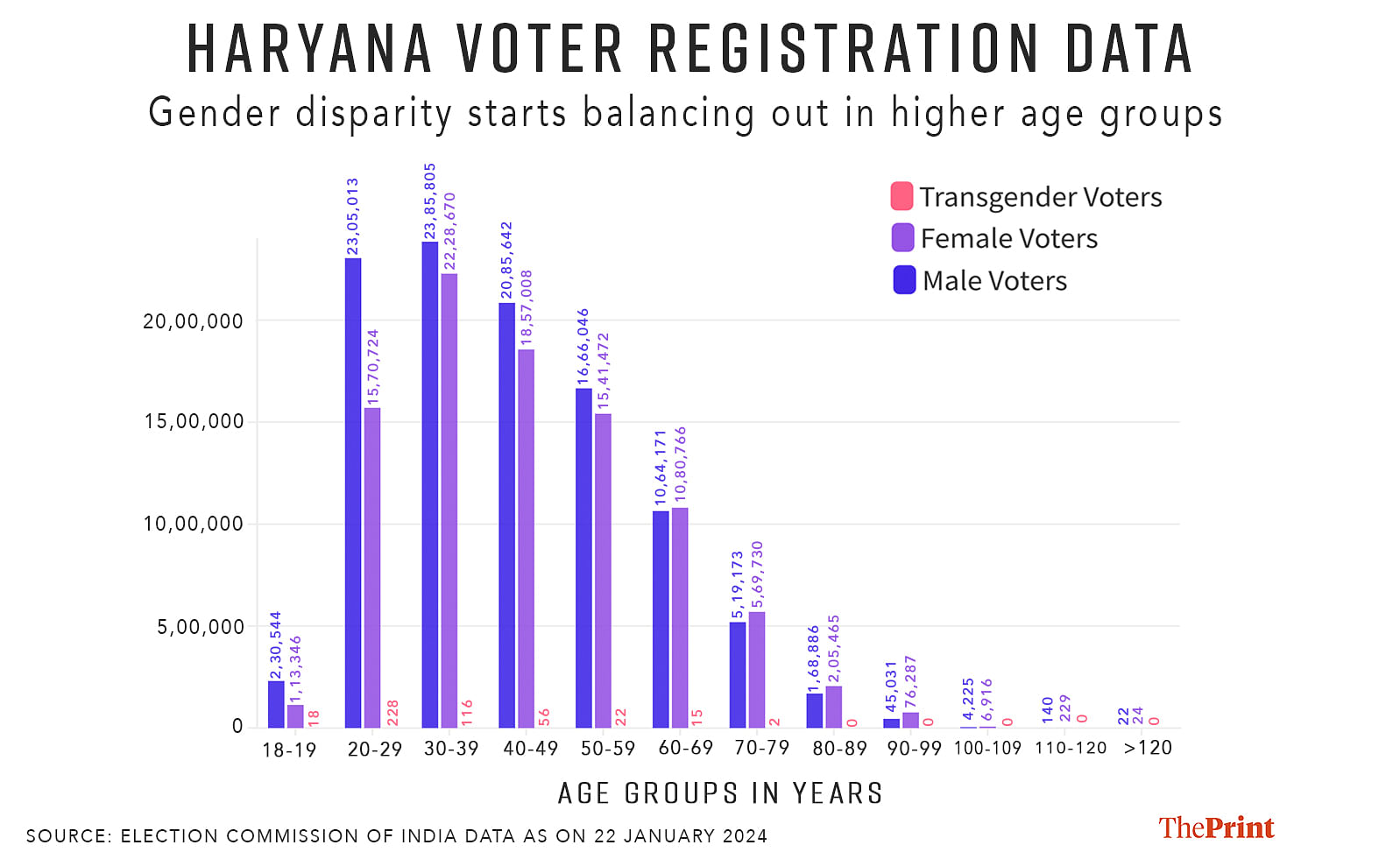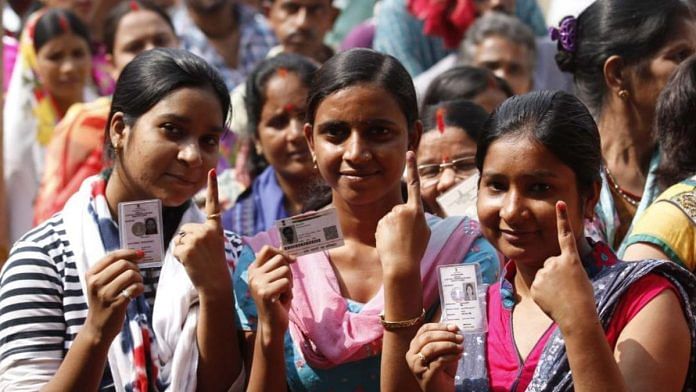Gurugram: Women make up just one-third of the total voters in the 18-19 years age group in Haryana, data released by the Manohar Lal Khattar government earlier this week has shown.
Of the 3,43,908 voters in this age group registered with the Election Commission of India (ECI) from Haryana (as on 22 January, 2024), 2,30,544 are male, 1,13,346 are female, and 18 are transgenders.
This is in stark contrast to the overall gender balance among voters in the state. Of the total 1.97 crore voters from Haryana, 1.05 crore (53.3 percent) are male and 92.5 lakh (47.7 percent) are female.
The data also shows that the gender disparity starts balancing itself out in higher age groups. In the 20 to 29 years age group, women make up 40 percent of the total voters. This situation improves considerably in the 30-39, 40-49, 50-59 years and above age groups.

To encourage more women to register as voters, the Haryana government had announced a scheme in October last year to give laptops, smartphones and pen drives as incentives to first-time female voters. The scheme had two categories — one for all age groups and another for the 18 to 19-year group — and the winners were selected through a lucky draw.
Interestingly, among the winners were 53-year-old Anwari from Faridabad, 52-year-old Ganwati from Rohtak, 51-year-old Savitri and 47-year-old Usha from Panipat, 48-year-old-Rumali from Jind, 42-year-old Savita Devi from Karnal, and 41-year-old Kusum from Sonipat — who had all registered as voters for the first time.
“I have seen the lists, and I am also surprised at the figures. It is definitely a cause for concern. We will look into why so many new women voters could not be registered,” Haryana Chief Secretary Sanjeev Kaushal told ThePrint.
According to Jagmati Sangwan, vice-president of the All India Democratic Women’s Association (AIDWA), the low number of young women voters demonstrated the patriarchal mindset of society in Haryana.
“The common mindset of people, particularly in the rural heartland of Haryana, is that a girlchild is someone else’s asset (ladki ek paraya dhan hai). For this reason, they don’t get her registered as a voter in her parental home with the argument that she will anyway be enrolled as a voter by her in-laws once after marriage,” Sangwan told ThePrint.
She added: “Another factor that discourages parents from getting their daughters to register as voters is the fear of conflicts and violence that may arise during elections, especially at the local level.”
“Elections, particularly of the panchayati raj institutions, often lead to enmities among the villagers and parents feel that by not enrolling their daughters as voters they are protecting them from exposing them to such animosities,” she explained.
Contacted by ThePrint, Haryana Chief Electoral Officer (CEO) Anurag Agarwal said that this time, the government had launched a special drive at schools and colleges to make girls aware of their voting rights, but somehow, they have not come forward to register in good numbers.
“This time we had an assistant electoral officer from the education department in the districts whose duty was to create awareness among students in schools and colleges,” he said.
Agarwal added that societal attitudes towards registration of women as voters can be gauged from the fact that among those selected by the Haryana government for incentives as first-time voters, was a woman aged 53, while several others were in their 40s.
A special revision of the voter list added 5,25,615 new voters, of which 1,41,290 were young voters aged 18-19 years, said Agarwal.
He added that the final voter list, which has 1.97 crore registered voters, comprising 1.05 crore men and 92.50 lakh women, has been published.
Also Read: Quota for women, votes for BJP? Politics behind women’s reservation bill
‘Patriarchal mindset’
AIDWA’s Jagmati Sangwan, quoted earlier, recalled that when she attained voting age, her parents too were hesitant.
She however said that social and cultural factors may not be the only reasons for the low percentage of women voters in the 18-19 years age group.
“One must not forget that the child-sex ratio (0 to 6 years) in the 2011 Census was 834, even poorer than the overall sex ratio of 879 recorded in the same Census. The poor child-sex ratio must be manifesting in the voter registration now because the children of that time are eligible voters now,” Sangwan said.
Professor Urmila Sharma, director, Women Studies Centre, SGT University, Gurugram, said that though the Haryana government launched the ‘Beti Bachao Beti Padho‘ campaign to save and educate daughters, the time has come when society itself should come forward to ensure that women were treated equally.
She claimed many people in Haryana didn’t consider it necessary for their daughters to register as voters because they have to ultimately move to their husbands’ homes after marriage.
“In my view, registration of children at the age of 18 should be made mandatory just like the registration of birth and death is made compulsory,” she asserted.
Meanwhile, Reicha Tanwar, former director of the Centre for Gender Studies at Kurukshetra University, Kurukshetra, said: “I am wondering if many women of that (18-19) age group have not registered as voters given the mindset in rural Haryana. Women are not supposed to have a voice nor are they allowed to speak their mind,” Tanwar told ThePrint.
She highlighted that men of that age group would go on their own and get registered for voting but no one bothers to take the initiative for young women.
“Another thing is that it is not uncommon in Haryana that unmarried women are not registered in their parents’ village on the premise they have to move after marriage,” Tanwar added.
(Edited by Richa Mishra)



